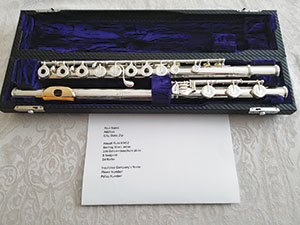Fall bring the start of the new school year or season for students and professionals alike. While adjusting to a new schedule, take the opportunity to establish new rituals. Take steps to prepare instruments for much use and travel to avoid mishaps of loss or injury. This list of tips will help you to keep your instruments safe and sound as well as provide advice for what to do if the worst occurs.
Preparation
Make sure your instruments are insured. Various policies are available through professional organizations and instrument insurance specialists. For students, a rider on their parent’s home insurance is possible. Carefully check renter insurance policies. Obtain an appraisal for all instruments from the manufacturer and keep it current. Appraisals are available on company websites. It is best to renew the appraisal every year after the August NFA convention when manufacturer’s price lists are updated. Register the instrument’s serial number with the manufacturer, especially if it was purchased from a third party.
Schedule a COA, (clean, oil and adjust) before school starts if at all possible. Preventive maintenance is always best. Reacquaint yourself with good maintenance habits, including how to assemble the flute correctly. Expensive flute repairs can be avoided with proper and thoughtful care of the instrument.
Take a picture of each of your instruments including the case, headjoint and serial number. Make note of the full description, such as off-set G key, C# trill etc., as well as the name and contact information of your insurance company, policy number, and serial number. Be sure to keep a copy of your appraisal and insurance policy in a separate place than your instrument. A paper copy as well as a scan on your phone and computer works well. Make note of other items of value in your flute bag such as flute stands, cleaning equipment, metronome, tuner, recording device, etc.
Purchase an outer case for your instrument to protect it from weather and travel. Some things to consider are whether you walk, drive or take public transportation. Depending on your location, consider a bag that does not advertise what is inside. Think about the weight of the bag and how it will be carried. Put a tag on the bag to identify it as yours and include contact information in case it is lost. It may be helpful to put a distinguishing element on it so you can quickly find your bag amid similar ones at rehearsals.
.jpg)
This bag is good because it does not advertise that there is a valuable instrument inside – but don’t leave it on the back of a chair in a restaurant.
If you use a locker, purchase the best lock on the market. A key lock is usually better than a combination lock. Make a copy of the key and secure it at home for emergencies.
Establish habits regarding the location of your instrument. Do you take it home from school every day? Do you leave it in a locker? Where do you put it when you arrive home? Where do you store it if you are away from home? Be consistent. Once something becomes habitual, you are more likely to follow the routine when you are especially busy or frantic.
If you take your flute into a restaurant or other place of business, never leave it unattended or hanging on the back of a chair. A flute can safely lay on your lap during a meal. Instruments should never be left in a car unattended. Take it with you. In a hotel, ask for a safe in your room or at the front desk. Use instrument security at conventions.

Take a picture of your instrument and keep a detailed description of it.
Shipping Your Flute
It is preferable not to ship a flute for repair, but it may be necessary. Keep the box the flute was originally shipped in and use it again. Packing a flute securely prevents damage. Put a card with your name, address, email, and phone numbers inside the case. The repair person or company can advise you on which company to use to ship your flute. Check your insurance policy to see if it protects against theft or damages in transit. Be sure the company knows where to ship the flute back to you. Ask them to call or text you when it has been shipped. College students may want to ask their teacher if the flute can be shipped back to them at the school to avoid it sitting on apartment steps.
Traveling by Plane
Pack instruments securely in carry-on luggage that is as small as possible. Carry a copy of your appraisal and proof of purchase. When going through security, open the case if questioned and follow the agent’s directions. For more specific information refer to the tips sheet provided by the U.S. Department of Transportation, www.transportation.gov/
If Something Happens
What should you do if your flute is lost or stolen?
• Start by retracing your steps to make sure you did not leave it in a classroom, restroom or bus. Text your teacher and friends to keep a look out for it.
• Contact the instrument room office and main office of your school to look out for it.
• Check with any applicable lost and found locations.
• If on campus, call campus police.
• After 24 hours, contact your insurance company and the instrument company. You will need: policy name, number, phone number for claims, a description of the flute including model, serial number and replacement value.
• Check pawn shops and yard sales in the area.
• Post information on a stolen flute list such as www.musicalchairs.info/flute/stolen. Other community online groups can also help.
In my experience, unfortunate situations occur especially when students are rushing through their busy schedules. In one case, a student took a bus to and from school every day with the same bus driver. When she left her flute on the bus one frantic day, the driver knew her and secured the flute and returned it to her. Another episode involved a piccolo. Numerous students had similar black gig bags. At the end of an ensemble rehearsal, the student hurriedly thrust her piccolo into the nearest bag. Later, when she prepared to practice, the piccolo was not there. Two weeks later, another student found the piccolo when she was cleaning out her bag.
Take the time this fall to make careful preparations and organize your case and paperwork. This will help avoid problems in the first place and allow you to swiftly take action if the worst should happen. With proper thought and preparation, hopefully this will never happen to you!






